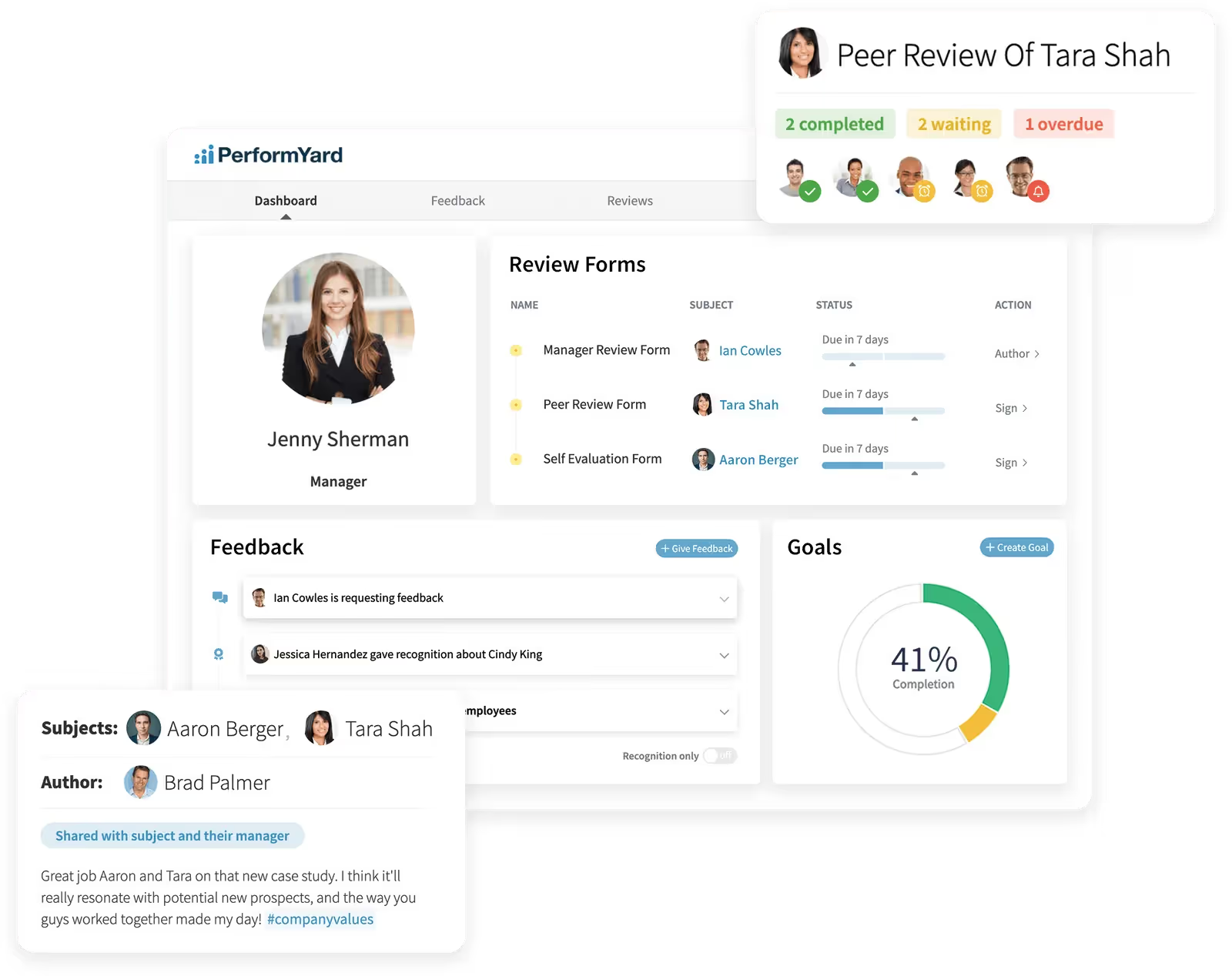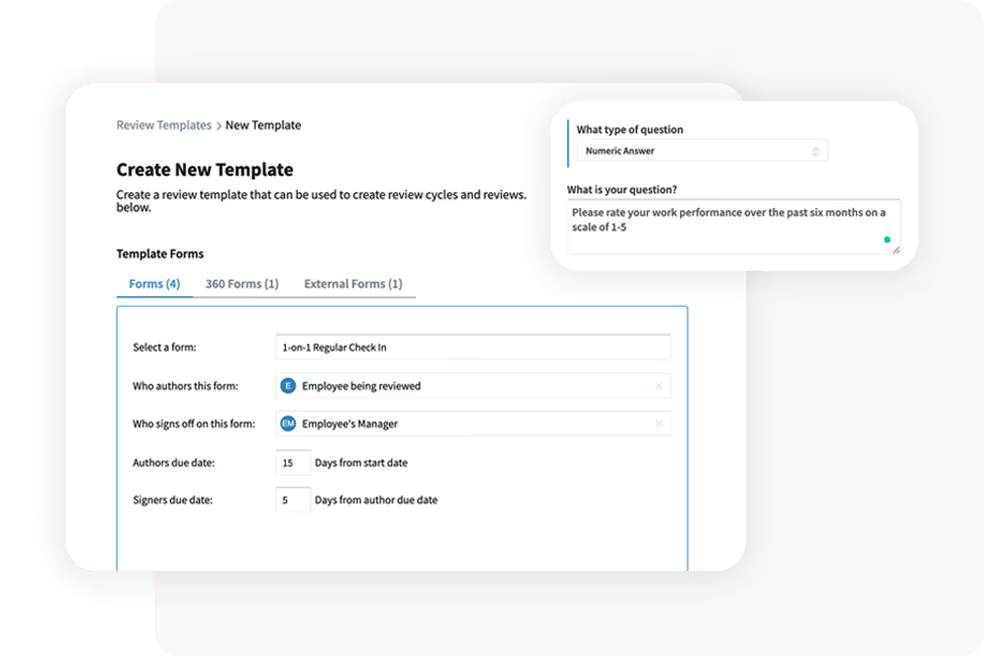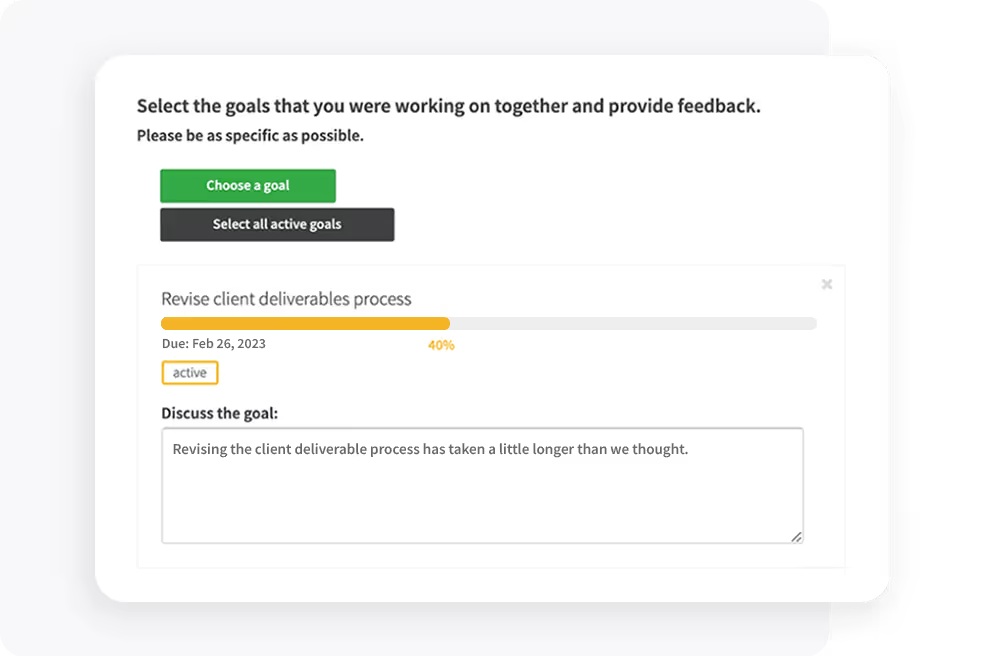Does a Performance Management Platform Work for Small Businesses?
A performance management system, a software or process that evaluates employee progress and performance over time, is a critical tool in any employer’s toolbox. With a performance management system, goals can be set, progress can be measured, feedback can be given, and reviews can be completed. Managers and leadership can examine performance on the individual, team, department, and company levels to find rising stars, concerning trends, or teams that need some additional help.
While having a performance management platform is ubiquitous in large companies, small businesses may wonder if having a performance management platform will work for them – or if the benefits will be worth the investment.
It’s a valid concern, which we’ll address in this article. We’ll take a look at how effective performance management systems can be, whether business size affects their performance and some examples of performance management software in practice.
Would a performance management system work for a small business?
Performance management systems bring dividends in two major areas: improving business growth and developing employees.
A performance management software suite can stimulate business growth by helping employees and departments set goals and track their progress. Cascading goals allow employees to align their goals with strategic company goals, so their progress will ultimately move the company forward.
Performance management, through feedback, check-ins, and goal setting, helps develop employees as well. By providing feedback, employees can make changes to their work style, doubling down on their strengths and fixing their weaknesses. Highly developed employees are more productive and can be promoted to higher roles in the company, reducing the need for costly outside hires.
Performance management systems (PMS) can be scaled to small businesses easily. While small businesses may believe that they can complete reviews and feedback informally, using a PMS to standardize the process leads to higher employer transparency, employee trust, greater feedback, and actionable data that employers can use – regardless of company size.
In other words, the size of the company doesn’t truly matter for performance management. If there are managers, employees, and peers, a performance management system can excel at any sized company.
James Cornett, VP of Administration at the North American Meat Institute, a nonprofit with fewer than 75 employees, described their transition to PerformYard:
“We went from a manual process to an automated platform that is truly time saving, but also very easy to learn.”
According to the PerformYard State of Performance Management Report, an analysis of more than 2,000 organizations revealed clear differences in employee net promoter scores (eNPS) by company size:
- Large companies (750+ employees) tend to have the highest eNPS scores, likely due to greater resource availability, established career paths, and organizational stability.
- Mid-size companies (100–250 employees) report the lowest eNPS scores, often facing challenges such as growth pains, evolving structures, communication breakdowns, and role ambiguity.
- Small companies (<50 employees) maintain relatively high engagement, supported by close-knit cultures and direct access to leadership, despite having fewer resources.

How effective is a performance management system?
You can’t improve something you’re not measuring.
Let’s say, as an example, you want to sell more shirts at your shirt store.
“How many are you currently selling?”
“I don’t know. I’ve never counted.”
It’s going to be hard to sell more if you don’t know how many you’re already selling.
A performance management system is a way to measure performance. Small business leaders simply can’t expect employees to “get better” if they don’t have a baseline metric for their performance.
Performance management systems are effective because they provide measurements for employees and departments: goal completion, goal progress, and performance reviews – employers can examine performance reviews over time to measure if employees are progressing, improving, or falling behind.
When promotions and compensation are tied to transparent metrics, such as performance reviews, employees feel empowered and motivated to work on their performance and goal completion to realize benefits.
Without performance management systems, employees and employers are often flying blind, relying on subjective memories and biases.
Some performance management examples for small businesses would include Cline Family Cellars along with Habitat for Humanity.
Cline Family Cellars, a family-owned winery in Sonoma, California, partnered with PerformYard to roll out a performance management process that standardized reviews, 1-on-1s, and goal processes. Previously, reviews were conducted on an ad-hoc basis, leaving employees confused and frustrated come review time. By implementing a performance management system, employees knew they would have a consistent review cycle, and were given key metrics they’d be measured against. This improved transparency and trust at the company.
Habitat for Humanity, a non-profit based in Philadelphia, had previously been completing performance reviews on paper. When they expanded past 20 employees, this became unworkable and made it nearly impossible to hold anyone accountable for their performance. While employees would get, on average, about 9 pages of review notes from managers and peers, the reviews were then simply filed away – never to be used or seen again.
By transitioning to a digital performance management system through PerformYard, Habitat for Humanity was able to roll out a comprehensive process with annual reviews, mid-year reviews, and performance improvement plans.
For us, it’s clear that the companies with the best performance management systems are the ones that use performance management to invest not only in their use for measuring performance but also in their ability to improve transparency and motivate employees.
Does company size affect your performance management system?
The challenges that small businesses face with Performance Management systems are unique but certainly not, ahem, unmanageable. For small businesses, challenges often include concerns about minimum contract cost, reporting structures, review frequency, and employee workload.
For small businesses, our solution is this: a simple performance management system is often the best performance management system. Don’t overcomplicate things. Custom templates, weighted reviews, upward reviews, and pulse surveys are great for larger businesses but can overburden small businesses that tend to run lean. Instead, focus on the key elements that make up a successful process: consistent reviews, goal setting, and feedback.
Certainly, company size will affect the size and complexity of your performance review system, but not the effectiveness of the product itself.
What is a performance review for a small business employee
A performance review for a small business employee should be no different than a performance review for any other employee.
Our ultimate guide to performance reviews spells out the elements that every performance review should feature. Here are the key elements:
- Make your reviews frequent
- Reviews should be objective and performance-oriented
- Incorporate goals
- Reviews should be transparent
- Make reviews conversational
- Take a holistic approach to feedback
- End with a clear understanding of the future
For a free performance review template, take a look at our guide here.

Selecting the right PMS for small businesses
Choosing the best performance management system for a small business means picking a performance management solution that can scale with your business, provide the solutions you need, and not burden you with additional features that aren’t critical to your business.
Finding the right performance review software for small companies can be challenging, as many have different tiers, with complicated pricing and confusing implementation costs. Often, the best PMS for a small business will be one that provides:
- Goal-setting
- Performance reviews
- Performance analysis
- Customizable review template
- Automated review cadences
- User-friendly interface
Costs associated with Performance Management Software
Typically, performance management software costs $5 - $10 per employee, per month, with a minimum contract of $5000 - $10,000. For a detailed look at PerformYard’s pricing, check out our page here.
Implementing a Performance Management System
As a small business, implementing a performance management system will in certain regards be easier, as there are fewer employees to onboard. However, the steps required generally will stay the same regardless of business size.
Here are the steps you’ll need to take to implement a performance management system for a small business.
Decide on a timeline
Decide on how frequently your small business employees will be reviewed – and if each of these reviews will carry the same weight. For instance, one small business may elect to do reviews every quarter (with each review weighted the same), while another may choose to have monthly reviews along with one big annual review that determines compensation going forward.
Consider punctuating these larger reviews with smaller, less formal reviews (such as check-ins and 1:1s) that help managers get a feel for performance while offering the opportunity for mentorship.
Choose your framework
Next, determine the framework you’ll use for your performance management process. Each framework allows you to look at performance from a different lens. Using the OKR, allows you to measure how well your employees meet goals they set out for themselves, while the balanced scorecard provides a more holistic view of performance.
Here are the major performance management frameworks you can take a look at for your small business.
Decide who will review your employees
Larger businesses may use multiple reviewers with a process like the 360 review, for example, which has an employee reviewed by peers, managers, and other employees at an organization. This can help HR get a “360 view” of a candidate’s performance.
For small businesses, this can be a particularly vexing question, as employees tend to wear many hats, and reporting structures can be less rigid. 360 reviews can mitigate these problems, providing leadership with more holistic views of their employees.
However, this can sometimes be challenging if businesses are too small and don’t have enough peers to make peer reviews manageable. In this case, it may be helpful to rely on “upward reviews,” where direct reports provide reviews of their managers. This can help managers learn to manage more effectively.
Determine what you’re measuring
Like we said earlier: you can’t change what you’re not measuring. You need to decide what you are measuring in your performance management process. Are you measuring how effectively employees complete goals? Or, are you measuring how well they exhibit specific behaviors expected of them in their roles? While the OKR method is great for measuring goals, it comes up short for measuring behaviors.
If you have a role (such as customer service) where OKRs may be less effective, you may want to focus on using BOS or BARS to measure.

Choose your questions
For your small business performance reviews, you’ll need to decide on the questions reviews themselves. Small businesses will likely have standardized questions, though they may vary by seniority – with managers having different questions than individual contributors.
Set your goals
One of the key steps in how to do performance management is goal setting.
Goal setting allows small businesses to quantify performance and guide employee growth and development. Foster a great performance management process by using SMART goals: specific, measurable, achievable, relevant, and time-based.
Collect your data
Come review time, it’s critical that you send out your review forms to the right people, and then collect that data. Now, you certainly could do this with printed-out forms, or you could even email out review templates to all of your reviews and then store them in a Google Drive folder. However, keeping track of all of those files can be overwhelming – it’s a big strain on your HR department, it’s inefficient, and files can get lost or altered all too easily.
That’s why it can be beneficial to use performance management software, like PerformYard. Performance management software puts your entire performance management process into one single tool – making it easy to store data, retrieve reviews, and analyze performance over time.

A performance management system is worth it for your small business
Performance management for small businesses tends to thrive when they provide simple, scalable, quantifiable performance management that tracks and measures performance and development.
PerformYard provides a scalable, simple performance management system that has simple, employee-based pricing, allowing small businesses to achieve the benefits of performance management through a solution that will scale with their business.
To learn more about taking the next step for small business performance management implementation, request a demo today.


